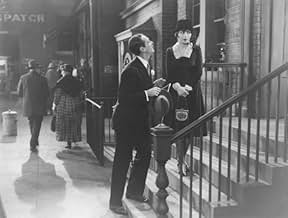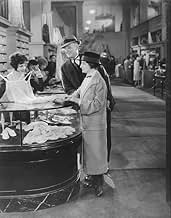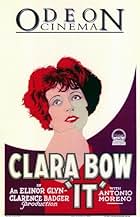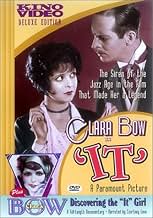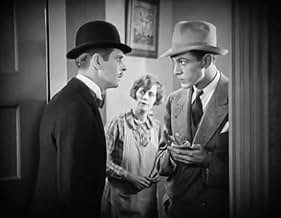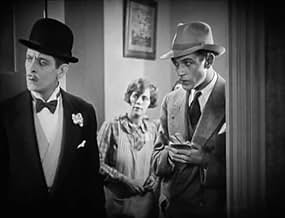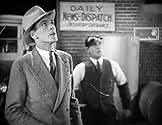CALIFICACIÓN DE IMDb
7.2/10
3.9 k
TU CALIFICACIÓN
Betty Lou es una vendedora de unos grandes almacenes que tiene mucho "eso" de lo que tanto se habla y persigue a un apuesto hombre de negocios.Betty Lou es una vendedora de unos grandes almacenes que tiene mucho "eso" de lo que tanto se habla y persigue a un apuesto hombre de negocios.Betty Lou es una vendedora de unos grandes almacenes que tiene mucho "eso" de lo que tanto se habla y persigue a un apuesto hombre de negocios.
- Dirección
- Guionistas
- Elenco
- Premios
- 1 premio ganado en total
Elinor Glyn
- Madame Elinor Glyn
- (as Madame Elinor Glyn)
Elmo Billings
- Office Boy
- (sin créditos)
Gary Cooper
- Newspaper Reporter
- (sin créditos)
Lloyd Corrigan
- Yacht Cabin Boy
- (sin créditos)
Cheryl Holt
- Baby
- (sin créditos)
Eleanor Lawson
- First Welfare Worker
- (sin créditos)
Rose Tapley
- Second Welfare Worker
- (sin créditos)
Dorothy Tree
- Waltham Employee
- (sin créditos)
Opiniones destacadas
If there's any question why Clara Bow became one of the top box office stars of the late silent era, "It" answers that question. The film, perhaps the one with which she will always be associated, is indeed a star turn, but a great one.
Bow,playing a counter girl who wins the heart of the owner of the great department store she works, turns in a memorable performance.
She brings everything you could want to the role, from great comic timing to a very robust physical presence. More than anything, of course, she is incredibly photogenic, a magnetic presence that simply lights up the screen.
Most heartening to me was the very large number of people well under 30 who viewed this film with me the night I saw it. They seemed to absolutely loved it.
Bow,playing a counter girl who wins the heart of the owner of the great department store she works, turns in a memorable performance.
She brings everything you could want to the role, from great comic timing to a very robust physical presence. More than anything, of course, she is incredibly photogenic, a magnetic presence that simply lights up the screen.
Most heartening to me was the very large number of people well under 30 who viewed this film with me the night I saw it. They seemed to absolutely loved it.
I decided I'd watch a little bit of this film on the computer. Knowing me I usually get distracted and stop watching but this film was so very different. My first silent film, and already a favourite. I could literally not stop watching Clara Bow, she was absolutely fascinating. I'd read David Stenn's wonderful biography on her so it was great to see her finally acting. When she's on screen you block out everything else and her acting ability wonderful - she can cry at the drop of a hat! So, instead of getting distracted I watched this movie the whole way through and enjoyed every moment of it... but my favourite parts were definitely with Clara. In fact, you could say I wasn't really interested in anyone else! This movie is HER movie. It's fun, flirty and just a great movie. I recommend it for anyone who loves silent movies, Clara Bow, or flirtatious movies pushing the limit. Age wise, I think I can recommend it for about 15 onwards - I'm 14 and I really enjoyed it - but not all teenagers will appreciate the film. Which is a pity, because it's wonderful!
I'm completely smitten with Clara Bow. After having seen Wings, and having just watched It and the TCM documentary Clara Bow: Discovering the It Girl, I have to say that she's just about the most amazing actress of the silent era. Even besides her limitless beauty, it seems like she can accomplish anything with her face. It's far too bad that she was never given a role that fully suited her immense talent. Wings is the closest she ever came to making a great film, it would seem, but, even though she steals the movie away from the other actors, the dogfights and action sequences steal the movie from her. So then It has to stand as her testament, the film that best demonstrates her legacy. And because of this, it's not surprising that Bow is all but forgotten. I mean, It certainly isn't a bad movie. It's a moderately well done romantic comedy where the shopgirl goes after her rich boss. It's fun and entertaining, but not necessarily something you'll remember for that long afterwords. Much like any romantic comedy that would be released today, among which the best is only an average movie. But then those looking to observe Clara Bow's talent don't exactly need another movie. Bow effortlessly raises the level of the project. It would have been rather average without her, but she makes it good. Quite good, in fact. I couldn't take my eyes off her, and I know that I'll visit the film again because of her. The other actors are mostly forgettable, except for William Austin. He plays the boss's best friend, and he's pretty obviously a homosexual. It's one of the more open depictions I've seen. He's quite funny, as well, and it's no mean feat that he wins any attention whatsoever away from Ms. Bow. 8/10.
Cyrus (Antonio Moreno) is the heir to a large, successful department store. He falls for counter girl Betty (Clara Bow), a young woman who definitely has "IT", that indefinable quality that makes certain people the center of attention. Cyrus' goofball friend Monty (William Austin) tries to facilitate the "opposite sides of the track" romance between his buddy and Betty, with more than a few hiccups along the way. Also featuring Priscilla Bonner, Jacqueline Gadsdon, Julia Swayne Gordon, and Gary Cooper.
This was based on a story by Elinor Glyn, and if you don't know the name, you sure will by the end of the movie. Her name is featured prominently in the opening credits, then in a title card explaining what "IT" is, then in a copy of the story being read by a character in the movie, and then when Glyn shows up for a cameo, playing herself! Anyway, most people have heard of this movie and the "It Girl" moniker that it gave Clara Bow for the rest of her life..
It's a decent romantic comedy of the period, with many little period details that make modern viewing interesting. The changes in fashions, manner and speech are amusing. I don't think I'd ever seen the exclamation "Hot Socks!" before. Bow is cute, and pushes the boundary for what a woman could do, say and look like on screen (near the end of the film as she climbs soaking wet out of the water with her clothing clinging to her, leaving little to the imagination, comes to mind). In that way It prefigures the coming Pre-Code early sound era.
This was based on a story by Elinor Glyn, and if you don't know the name, you sure will by the end of the movie. Her name is featured prominently in the opening credits, then in a title card explaining what "IT" is, then in a copy of the story being read by a character in the movie, and then when Glyn shows up for a cameo, playing herself! Anyway, most people have heard of this movie and the "It Girl" moniker that it gave Clara Bow for the rest of her life..
It's a decent romantic comedy of the period, with many little period details that make modern viewing interesting. The changes in fashions, manner and speech are amusing. I don't think I'd ever seen the exclamation "Hot Socks!" before. Bow is cute, and pushes the boundary for what a woman could do, say and look like on screen (near the end of the film as she climbs soaking wet out of the water with her clothing clinging to her, leaving little to the imagination, comes to mind). In that way It prefigures the coming Pre-Code early sound era.
Clara Bow's energy and glamour give this otherwise lightweight feature some life, making it quite a bit better than it had any right to be. The rest of the production does have a couple of strengths, but not enough to carry the load. The story is pleasant and generally entertaining, but rather negligible. The "It" theme is overworked, and downplaying it in favor of a little more substance might have improved the movie. Yet it is still certainly worth seeing.
Bow gets a character that allows her to use her strengths while also giving her a chance to do some other things as well, as her character goes through a series of romantic episodes and other experiences. Perhaps one reason why this is one of her best-remembered features is that the role gives her some opportunities to show different sides of her character, as she uses her facial expressions and other resources pretty well.
The rest of the cast is just there for Bow to play off of, and the characters are mostly one-dimensional. Antonio Moreno is solid but sometimes lifeless, and his friend Monty is an annoying character whose only constructive purpose is to advance the plot at a couple of key stages.
One minor asset of the movie is the inter-titles, several of which add a bit of bite to some otherwise trite situations. But the constant references to the "It" concept, which apparently come from the Elinor Glyn source material, get old quickly. It's hardly a very imaginative or significant concept, and a couple of passing references would have been more than enough, so as to allow the story to stand more on its own.
The story itself is told rather well, and there are some enjoyable sequences, especially towards the end. While the whole thing is too superficial to belong on any best-of or must-see lists - especially in a year that produced so many outstanding and significant films - it's a generally entertaining little feature, and it is one of the best showcases for Clara Bow, who was one of the most popular performers of the 1920s.
Bow gets a character that allows her to use her strengths while also giving her a chance to do some other things as well, as her character goes through a series of romantic episodes and other experiences. Perhaps one reason why this is one of her best-remembered features is that the role gives her some opportunities to show different sides of her character, as she uses her facial expressions and other resources pretty well.
The rest of the cast is just there for Bow to play off of, and the characters are mostly one-dimensional. Antonio Moreno is solid but sometimes lifeless, and his friend Monty is an annoying character whose only constructive purpose is to advance the plot at a couple of key stages.
One minor asset of the movie is the inter-titles, several of which add a bit of bite to some otherwise trite situations. But the constant references to the "It" concept, which apparently come from the Elinor Glyn source material, get old quickly. It's hardly a very imaginative or significant concept, and a couple of passing references would have been more than enough, so as to allow the story to stand more on its own.
The story itself is told rather well, and there are some enjoyable sequences, especially towards the end. While the whole thing is too superficial to belong on any best-of or must-see lists - especially in a year that produced so many outstanding and significant films - it's a generally entertaining little feature, and it is one of the best showcases for Clara Bow, who was one of the most popular performers of the 1920s.
¿Sabías que…?
- TriviaElinor Glyn gave many confusing and sometimes contradictory explanations for what "It" meant, but she always said that "It" did not mean "sex appeal" necessarily and that anyone who said it did was vulgarizing her concept. Nonetheless, "It" became a euphemism for "sex appeal," which caused that pronoun to be entered into the American lexicon as a noun in the late 1920s.
- ErroresAs Waltham climbs onto the anchor, his shirt sleeve is intact. The scene cuts away to Monty and Adela in the rowboat for a brief moment; however, in the next scene, Waltham's sleeve is completely torn.
- Citas
Monty Montgomery: I feel so low, old chap, that I could get on stilts and walk under a dachshund.
- ConexionesFeatured in The House That Shadows Built (1931)
Selecciones populares
Inicia sesión para calificar y agrega a la lista de videos para obtener recomendaciones personalizadas
- How long is It?Con tecnología de Alexa
Detalles
Taquilla
- Total en EE. UU. y Canadá
- USD 411,891
- Tiempo de ejecución
- 1h 12min(72 min)
- Color
- Mezcla de sonido
- Relación de aspecto
- 1.33 : 1
Contribuir a esta página
Sugiere una edición o agrega el contenido que falta

